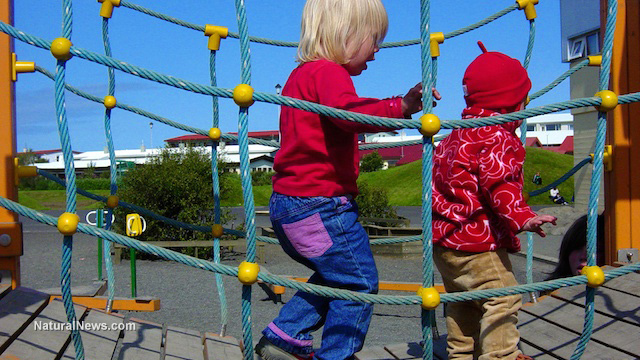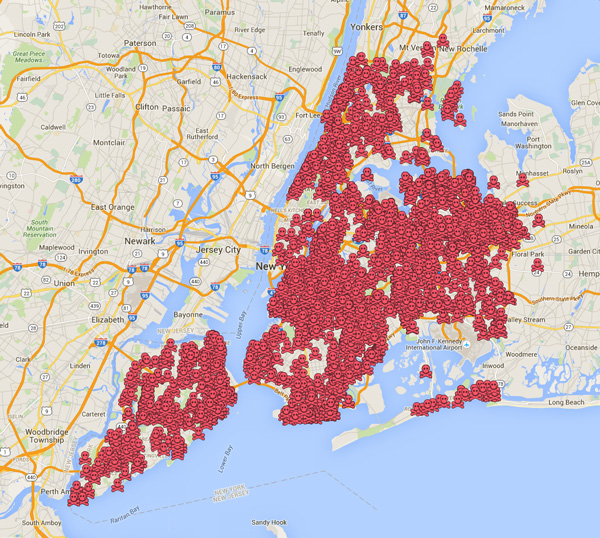New York City being INUNDATED with toxic glyphosate herbicide, with high intensity spraying of children's playgrounds and parks
Thursday, July 14, 2016 by: Ethan A. Huff, staff writer
Tags: glyphosate, New York, public parks

(NaturalNews) Is your favorite public park a green, weed-free oasis? Chances are if it looks too manicured to be true, it's brimming with chemical herbicides like glyphosate that are putting you, your children and your pets at risk.
Many cities spray these poisons by the thousands of gallons per year on grass and in flowerbeds to keep things looking tidy, but at a huge price: Many of these chemicals are linked to neurological damage, birth defects and cancer.
In New York City alone, local governments apply more than 100,000 pounds of pesticides annually in green spaces, and that amount is constantly increasing. According to a parks report from 2014, NYC parks workers applied pesticides 162,584 times that year, the immense scope of which you can see visually in the following infographic (compliments of parks data compiled by the performance activist group, Reverend Billy and the Stop Shopping Choir):

As you can see, glyphosate in the form of Monsanto's "Roundup Pro Max" herbicide is being applied everywhere throughout New York City, without the public's consent. Most New Yorkers and those visiting the city aren't aware of this mass chemical poisoning, because it isn't visible to the naked eye, save for the artificial uniformity it creates in the natural landscape.
The average onlooker sees the result of these chemicals as beauty – look, no weeds! – but little does he or she realize what's hiding beneath the surface. As children traipse through all those lush blades, they pick up traces of a chemical that the World Health Organization (WHO) agrees is probably carcinogenic, meaning it causes cancer.
Glyphosate has also been shown in independent studies to damage vital organs – even at very low levels – and environmentally to strip growing plants of nutrients, rendering our food crops nutritionally deficient.
The even worse news is that New York City isn't the only place where glyphosate is used: San Francisco, Seattle, Oakland, Portland, Philadelphia and many other major cities use this popular weedkiller in their public spaces as well.
"It is not acceptable that ourselves, our children and the animals we share our community with are being routinely exposed to these chemicals whether we like it or not," says Elli Rivers, founder of a campaign in the UK seeking to stop the spraying of glyphosate in Salisbury city parks.
"This is a matter of great importance for those of us who care about each other's health and the health of our children, our cats, our dogs and all the flora and fauna of this city, of course including our beloved bees."
Chicago and Boulder already glyphosate-free, proving that green spaces can be properly managed without Monsanto
The Toxics Action Center (TAC) advises against the use of chemical pesticides and herbicides, advocating instead for integrative lawn management strategies that focus on soil pH, water retention and soil compactness. If a lawn is mowed correctly and the soil in which it's grown is managed properly, weeds and even insects can be avoided.TAC's full report on how to grow a truly "green" lawn is available here.
Other major cities like Chicago and Boulder are already utilizing some of these green practices – both urban areas have banned the use of glyphosate – but there's still a lot of work to be done elsewhere.
The New York City Parks Department has also indicated its willingness to adopt an alternative management approach that would "reduce the need for these herbicides," an open-minded position that we hope many other cities will adopt as well.
Chlorella, in case you weren't aware, is a powerful detoxifying nutrient that's helped many people overcome health damage caused by pesticide exposure.
Sources for this article include:
PostBulletin.com
EcoWatch.com
EnvironmentalHealthNews.org
Glyphosate at FETCH.news
Get independent news alerts on natural cures, food lab tests, cannabis medicine, science, robotics, drones, privacy and more.
Take Action: Support Natural News by linking to this article from your website
Permalink to this article:
Embed article link: (copy HTML code below):
Reprinting this article:
Non-commercial use OK, cite NaturalNews.com with clickable link.
Follow Natural News on Facebook, Twitter, Google Plus, and Pinterest
- The aloe vera miracle: A natural medicine for cancer, cholesterol, diabetes, inflammation, IBS, and other health conditions
- Family sues pharmaceutical company over child brain damaged by flu vaccine
- Cultivate vibrant health and a clear mind with the wisdom of Ayurveda
- Bill Gates in global push to vaccinate every child on the planet
- Whole Body Detox (Part 1): Lymphatic Cleansing With Rebound Exercise
- Environmental Working Group releases 2015 Clean Fifteen and Dirty Dozen produce lists for safe eating
- Time Warner cancels show that exposes TSA thugs and cancer-causing body scanners
- GMOs Alter the Genetic Make Up of Our Healthy Bacteria
- Six natural remedies for acid reflux
- Modern-day vaccines have their roots in Nazi medical experiments
- Herbs for effective blood pressure management
- Anti-Smoking Drug Chantix Causes Potentially Deadly Traffic Accidents
- Indian black salve: The magical cancer cure
- Measles vaccines kill more people than measles, CDC data proves
- Astaxanthin: The Miracle Antioxidant and Anti-Inflammatory Nutrient
- Natural remedies and tips to prevent, relieve and eliminate painful shingles outbreaks
- Oxygenate your body - How to restore oxygen balance and help prevent disease
- New Powerful Three Minute Exercise Improves Memory and Brain Health
- Curcumin slays cancer cells in their tracks
- The REAL FAKE NEWS exposed: '97% of scientists agree on climate change' is an engineered hoax... here's what the media never told you
- Foods, herbs, and supplements that kill cancer - safer and more effective than drugs
- The aloe vera miracle: A natural medicine for cancer, cholesterol, diabetes, inflammation, IBS, and other health conditions
- Water purification breakthrough revealed: AquaTru countertop water purifier removes 128 toxic chemicals, fluoride, heavy metals and more
- Boost Low White Blood Cell Count and Immune Function Naturally
- Dr. Blanche Grube explains when it is wise to keep your wisdom teeth at the Holistic Oral Health Summit
- What Your Doctor did Not Tell You about Food Intolerances
- Magnesium and your health
- Study Finds Chinese Red Yeast Rice Good for Your Heart
- Health secrets revealed on the next NaturalNews Talk Hour
- Health benefits of Bromelain: An anti-inflammatory enzyme
- Avoid vaccines and use these top four natural remedies for flu prevention instead
- If given a fair choice, most consumers would choose alternative medicine over conventional health care
- Bill Gates GMO Zombie Eggs
- The best, and worst, laundry detergents with 1,4-dioxane contamination
- Zeolite detox myths busted: In lab tests, zeolites do NOT bind with aluminum, lead, uranium, mercury or cadmium... only CESIUM
- Food addiction more than willpower, a serious disease suffered by many
- The REAL FAKE NEWS exposed: '97% of scientists agree on climate change' is an engineered hoax... here's what the media never told you
- Red Cabbage Found to Contain 36 Anti-Cancer Anthocyanins
- Beat cancer with 35% hydrogen peroxide
- The 10 worst toxins hidden in vitamins, supplements and health foods
- Four supplements that will benefit almost everyone
- Untested vaccines causing new wave of polio-like paralysis across India
- Canadian agency attacks Jenny McCarthy for demanding mercury-free vaccines
- Curcumin slays cancer cells in their tracks
- Bill Gates says vaccines can help reduce world population
- Top foods, herbs and supplements to keep on hand in the event of a nuclear crisis
- The United Nations 2030 Agenda decoded: It's a blueprint for the global enslavement of humanity under the boot of corporate masters
- Before his death, father of ADHD admitted it was a fictitious disease
- Flu vaccines causing massive spike in deaths of elderly across the UK, warn health officials
- Vitamin E kills off cancer cells and prevents their reproduction, study finds
- Vaccines lower immunity
- Boost Low White Blood Cell Count and Immune Function Naturally
- Vitamin B-12 warning: Avoid cyanocobalamin, take only methylcobalamin
- Apricot Seeds Kill Cancer Cells without Side Effects
- EPA advisor admits the agency is funneling billions to climate groups ahead of Trump’s return to White House
- Newly released JFK files reveal Pentagon's role in creating Lyme disease and covid in the same lab
- Eleven days before Iran bombed Tel Aviv, my microscope revealed haunting images of EXACTLY what would happen
- Morphic resonance “remote viewing” reveals iconic Middle East images of stealth bombers, a falcon and a one-horned ram
- Mike Adams releases country western hit single: Goin’ Back in Time is Comin’ Home
- DECENTRALIZED SPIRITUALITY and the true teachings of Christ: Overcoming the censorship, threats and lies of organized religion to truly know God and the Universal Christ
- Global leaders unite to clamp down on “misinformation” with UN-backed Cascais Declaration
- BOMBSHELL: Covid-19 mRNA nanoparticles EMIT LIGHT SIGNALS that communicate MAC addresses used for self-assembly inside the blood vessels
- I Want My Bailout Money – new song released by Mike Adams
- HEALTH SECRETS: How to Instantly Block MSG Toxicity Using Natural Substances (and the secret of Methylene Blue)
- The Health Ranger releases “Vaccine Zombie” song and music video, using AI-animated zombies for the music video
- BOMBSHELL: Internal Pfizer documents exposed and reveal at least 16 PERCENT of their mRNA vaccine "adverse events" are REPRODUCTIVE DISORDERS
- Two containers with completed ballots fall out of truck in Florida
- BOMBSHELL: DNA testing kits are a SCAM to develop ethnic-specific bioweapons
- Amazing microscopy photos reveal how freezing crystals attempt to mimic electronic structures they are touching
- RFK Jr. clears key hurdle: Sen. Susan Collins backs controversial HHS nominee, signaling a new era for health policy
- HYSSOP: What research reveals about the health benefits of this ancient holy herb
- The Coming Gold Revaluation: Strategic Financial Realignment in an Era of Dollar Collapse
Science News & Studies
Medicine News and Information
Food News & Studies
Health News & Studies
Herbs News & Information
Pollution News & Studies
Cancer News & Studies
Climate News & Studies
Survival News & Information
Gear News & Information
News covering technology, stocks, hackers, and more



"Big Tech and mainstream media are constantly trying to silence the independent voices that dare to bring you the truth about toxic food ingredients, dangerous medications and the failed, fraudulent science of the profit-driven medical establishment.
Email is one of the best ways to make sure you stay informed, without the censorship of the tech giants (Google, Apple, Facebook, Twitter, YouTube, etc.). Stay informed and you'll even likely learn information that may help save your own life."
–The Health Ranger, Mike Adams























